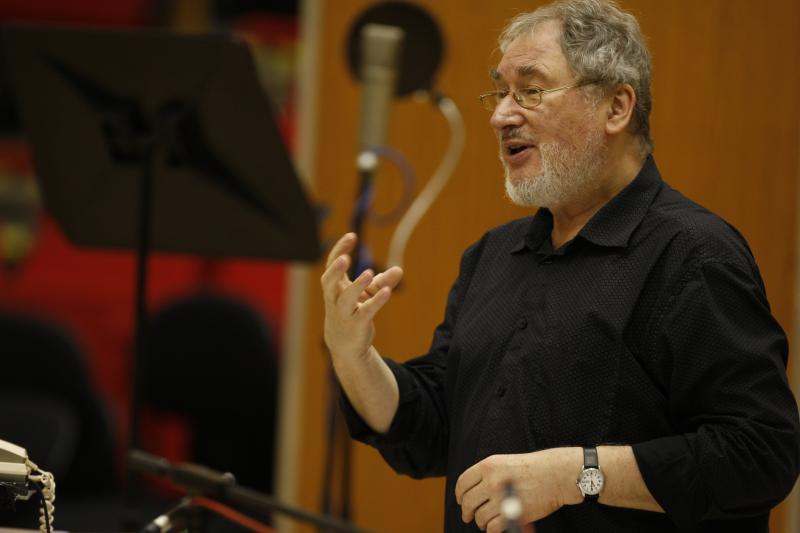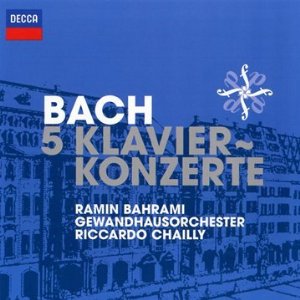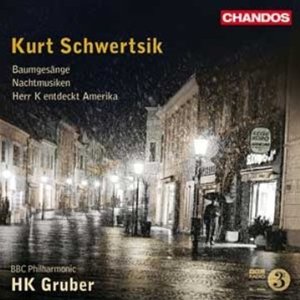Classical CDs Weekly: Bach, Schwertsik, Shostakovich | reviews, news & interviews
Classical CDs Weekly: Bach, Schwertsik, Shostakovich
Classical CDs Weekly: Bach, Schwertsik, Shostakovich
Baroque keyboard concertos, contemporary music from Austria and a famous 1960s Prom


We’re spoilt for choice in these concertos; Perahia, Schiff and Hewitt have given us excellent versions, and another new one by Alexandre Tharaud has just been released by Virgin Classics. I prefer Bach’s solo keyboard music played on piano, but I’m willing to concede that period instruments can suit the keyboard concertos better, given the delicious contrast in timbre between harpsichord and bowed strings. These readings, played by the Iranian-born pianist Ramin Bahrami, are good enough to make me never want to hear a harpsichord again. Subtly faster speeds mean that it’s possible to squeeze all five concertos onto one disc. And, combined with Chailly’s immaculate, big-hearted accompaniments, Bahrami’s effortless style and panache make listening to the disc a life-enhancing experience. Bach can be a scarily intense composer, but these pieces are among the most approachable he produced. The many sequential passages sound reassuringly predictable in places. You think you know what’s coming next and start humming along, only to be wrong-footed by a quirky modulation or turn of phrase.
Bahrami plays with a jazzy flexibility and real sense of fun; passagework is immaculate and his left-hand technique is superb, notably when the D minor concerto’s main theme bounces around in the bass under right-hand trills. He rarely touches the sustaining pedal, so the clarity is dazzling. In less flamboyant mode, Bahrami is compelling – the slow movements of the D major and F minor concertos offer some of the most poised, musical playing you'll hear. Essential listening - Chailly’s recent modern-instrument Bach recordings have all triumphed, and this disc is no exception.
Watch Ramin Bahrami play the Largo from Bach's Fifth Keyboard Concerto

Listening to new music can be more of a dutiful slog than a pleasure. This disc of music by the quirky Austrian Kurt Schwertsik is a consistent joy. Schwertsik was born in 1935, attending courses in Darmstadt where he encountered music by the likes of Stockhausen, Cage and Nono. His own compositional style soon became far more eclectic, and he became a member of a group known as the Third Viennese School - writing music which was broadly tonal, paying homage to composers from Mozart to Webern. Schwertsik is far more than a skilled pastiche artist – ghosts from several centuries of Western art music drift in and out of these scores without overwhelming a distinctive and drily witty personality. Mahler and Janáček make their presence felt in Nachtmusiken; the title a reference to the two nocturnal inner movements of Mahler’s Seventh Symphony. The opening movement is an affectionate tribute to Janáček - a tender tour de force of nagging ostinati, speech-like melodies and glowering brass chords.
The Kafka-inspired Herr K entdeckt Amerika is more eclectic; there’s a pitch-perfect Mahler send-up in the second movement and nods towards Minimalism in the brief finale. The third work on the disc is 1992’s Baumgesänge; six arboreal miniatures encompassing a staggering emotional and musical range within a 21-minute span. The BBC Philharmonic play with phenomenal swagger and they’re conducted by HK Gruber – a long-time friend of the composer. Gruber’s contribution to the CD booklet is fascinating – he writes of Schwertsik’s view of tonality “as an old machine, as old as humanity… we had to lubricate it and learn again how to run it”. Fantastic stuff, and sumptuously recorded. Nice cover photo too.
 Shostakovich: Symphony No 10 USSR State Symphony Orchestra/Evgeny Svetlanov (ICA Classics)
Shostakovich: Symphony No 10 USSR State Symphony Orchestra/Evgeny Svetlanov (ICA Classics)
In which a famous foreign orchestra’s visit to an August Prom is disrupted by audience protests. This is not the Israel Philharmonic in 2011, but the famous occasion in 1968 where Evgeny Svetlanov’s orchestra came to play in three Proms, unfortunately coinciding with the arrival of Soviet tanks on the streets of Prague. In a remarkable accident of programming, Mstislav Rostropovich played Dvořák's Cello Concerto in the first half. Colin Anderson’s sleeve note recounts how the tension in the hall had dissipated by the time of the interval, but the opening rumble of Shostakovich’s Tenth is inaudible under the audience noise; ironic given that this was a symphony by a composer who had long enjoyed an uneasy relationship with authority. Is the performance worthy of more than historical interest? Yes, it is – there’s a savage intensity to the playing that must have been partly due to the atmosphere present. Svetlanov’s opening Moderato builds inexorably, making shrewd use of the USSR State Symphony Orchestra’s magnificent lower strings. There’s not an ounce of fat in this music – every bar, every phrase counts, and the closing piccolo duet is a chiller. The four-minute Scherzo really screams, and the sheer muscularity of the string playing is astonishing, despite the occasionally murky mono sound.
Shostakovich’s emotionally ambivalent third movement still baffles – are the horn calls an oblique Mahlerian reference or a declaration of love? Svetlanov’s fast speed for the main section of the Finale is tackled with complete security by his players. He brilliantly captures the shift in mood from the jauntiness of the opening clarinet theme to the menace as the music collapses eight minutes in. And after the composer’s DSCH motto blares out on horns and lower brass for the last time the audience erupts. It’s gripping. There are also items recorded during the following two Proms – Tchaikovsky’s Melodrama from The Snow Maiden, and two extracts from Rimsky-Korsakov’s Invisible City of Kitezh. Each is beautifully, idiomatically shaped and ecstatically received.
Buy
Explore topics
Share this article
The future of Arts Journalism
You can stop theartsdesk.com closing!
We urgently need financing to survive. Our fundraising drive has thus far raised £49,000 but we need to reach £100,000 or we will be forced to close. Please contribute here: https://gofund.me/c3f6033d
And if you can forward this information to anyone who might assist, we’d be grateful.

Subscribe to theartsdesk.com
Thank you for continuing to read our work on theartsdesk.com. For unlimited access to every article in its entirety, including our archive of more than 15,000 pieces, we're asking for £5 per month or £40 per year. We feel it's a very good deal, and hope you do too.
To take a subscription now simply click here.
And if you're looking for that extra gift for a friend or family member, why not treat them to a theartsdesk.com gift subscription?
more Classical music
 Echo Vocal Ensemble, Latto, Union Chapel review - eclectic choral programme garlanded with dance
Beautiful singing at the heart of an imaginative and stylistically varied concert
Echo Vocal Ensemble, Latto, Union Chapel review - eclectic choral programme garlanded with dance
Beautiful singing at the heart of an imaginative and stylistically varied concert
 Scott, Irish Baroque Orchestra, Whelan, RIAM, Dublin review - towards a Mozart masterpiece
Characteristic joy and enlightenment from this team, but a valveless horn brings problems
Scott, Irish Baroque Orchestra, Whelan, RIAM, Dublin review - towards a Mozart masterpiece
Characteristic joy and enlightenment from this team, but a valveless horn brings problems
 Classical CDs: Voice flutes, flugelhorns and froth
Baroque sonatas, English orchestral music and an emotionally-charged vocal recital
Classical CDs: Voice flutes, flugelhorns and froth
Baroque sonatas, English orchestral music and an emotionally-charged vocal recital
 Kanneh-Mason, Britten Sinfonia, Shave, Milton Court - a grin and a big beaming smile
A pair of striking contemporary pieces alongside two old favourites
Kanneh-Mason, Britten Sinfonia, Shave, Milton Court - a grin and a big beaming smile
A pair of striking contemporary pieces alongside two old favourites
 theartsdesk at the New Ross Piano Festival - Finghin Collins’ musical rainbow
From revelatory Bach played with astounding maturity by a 22 year old to four-hand jazz
theartsdesk at the New Ross Piano Festival - Finghin Collins’ musical rainbow
From revelatory Bach played with astounding maturity by a 22 year old to four-hand jazz
 First Person: Manchester Camerata's Head of Artistic Planning Clara Marshall Cawley on questioning the status quo
Five days of free events with all sorts of audiences around Manchester starts tomorrow
First Person: Manchester Camerata's Head of Artistic Planning Clara Marshall Cawley on questioning the status quo
Five days of free events with all sorts of audiences around Manchester starts tomorrow
 Goldscheider, Brother Tree Sound, Kings Place review - music of hope from a young composer
Unusual combination of horn, strings and electronics makes for some intriguing listening
Goldscheider, Brother Tree Sound, Kings Place review - music of hope from a young composer
Unusual combination of horn, strings and electronics makes for some intriguing listening
 theartsdesk Q&A: composer Donghoon Shin on his new concerto for pianist Seong-Jin Cho
Classical music makes its debut at London's K-Music Festival
theartsdesk Q&A: composer Donghoon Shin on his new concerto for pianist Seong-Jin Cho
Classical music makes its debut at London's K-Music Festival
 Helleur-Simcock, Hallé, Wong, Bridgewater Hall, Manchester review - moving lyricism in Elgar’s concerto
Season opener brings lyrical beauty, crisp confidence and a proper Romantic wallow
Helleur-Simcock, Hallé, Wong, Bridgewater Hall, Manchester review - moving lyricism in Elgar’s concerto
Season opener brings lyrical beauty, crisp confidence and a proper Romantic wallow
 Kohout, Spence, Braun, Manchester Camerata, Huth, RNCM, Manchester review - joy, insight, imagination and unanimity
Celebration of the past with stars of the future at the Royal Northern College
Kohout, Spence, Braun, Manchester Camerata, Huth, RNCM, Manchester review - joy, insight, imagination and unanimity
Celebration of the past with stars of the future at the Royal Northern College

Add comment